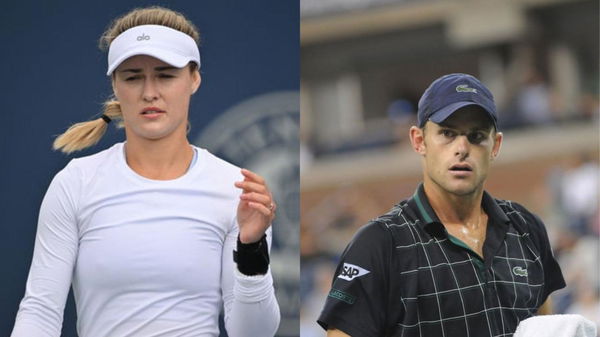

Anna Kalinskaya found herself at the center of controversy during her US Open match against Beatriz Haddad Maia, as her VAR challenge turned out unsuccessful, amidst questionable officiating. Leading 2-0 in the first set, Kalinskaya challenged a crucial point, but the umpire’s decision after the review sparked a controversy and widespread debate. The American tennis legend Andy Roddick was quick to voice his disapproval as well, as he took a sly dig at the umpire’s call and highlighted the ongoing issues with officiating in the sport.
The incident unfolded when Kalinskaya, who was leading in the first set, requested a video review, as she was convinced that Haddad Maia had won a point off a double bounce, which should have been rightfully awarded to her. Chair umpire Miriam Bley reviewed the footage but ultimately ruled in favor of Haddad Maia, deeming the shot valid and allowing the point to stand.
The decision left Kalinskaya and many spectators frustrated, as it seemed to contradict the evidence on the screen. A day after the incident, Andy Roddick took to his X handle, to share his thoughts on it, highlighting how it was not the right decision. He wrote, “Us: There’s finally replay available for every situation. All right there to see. What could possibly go wrong? Umpire: hold my beer.”
ADVERTISEMENT
Article continues below this ad
Us: There’s finally replay available for every situation. All right there to see. What could possibly go wrong ?
Umpire: hold my beer 🍺
— andyroddick (@andyroddick) September 1, 2024
The controversial call seemed to rattle Kalinskaya, who struggled to regain her composure and managed to win only two of the next 14 games. Possibly due to this change in momentum, Haddad Maia was able to take control of the match and advance to the Round of 16, where she will take on Caroline Wozniacki.
The umpire’s decision garnered a lot of backlash and sparked widespread criticism, with renowned tennis journalist Jose Morgado expressing his disbelief as well, as he wrote on X, “What? AHAHAHAHAHAH It’s a clearly ILLEGAL PLAY!!!!!! Everybody is watching.”
The introduction of Hawk-Eye technology is often credited to matches like these, where questionable line calls have significantly impacted players. Anna Kalinskaya, much like Serena Williams and others before her, fell victim to poor officiating, which highlighted the ongoing challenges in ensuring fair play.
ADVERTISEMENT
Article continues below this ad
Anna Kalinskaya’s controversy opens up the door to a lot more debates
Controversial umpiring decisions have plagued many top players in recent years. Coco Gauff made headlines when she slammed the umpire over a questionable line call during her French Open semifinal against Iga Swiatek, a moment that highlighted the ongoing frustrations with officiating. Last year at Wimbledon, Andy Murray endured a heartbreaking error in his second-round match against Stefanos Tsitsipas, further fueling debates over the reliability of line calls.
Even Novak Djokovic has raised his voice against poor decisions multiple times throughout his career, underscoring the need for continued improvements in officiating standards across the sport. A few weeks prior, Felix Auger-Aliassime and Jack Draper were involved in another contentious incident during the Cincinnati Masters, which prompted Novak Djoković to express his annoyance.
ADVERTISEMENT
Article continues below this ad
Djokovic said, “It’s embarrassing that we don’t have video replay of these kinds of situations on the court. What’s even more ridiculous is that we don’t have the rule in place that would allow chair umpires to change the original call based on the video review that happens off the court.”
Amid the criticism from the players, the question arises: what should the authorities do when, despite the technology, the match officials fail to deliver the right decisions all the time? This situation leaves players in a difficult situation, as they have to navigate the complexities of officiating that even advanced systems can’t fully resolve.
Have something to say?
Let the world know your perspective.


What’s your perspective on:
Did the chair umpire rob Anna Kalinskaya of her US Open dream? Andy Roddick seems to think so!
Have an interesting take?